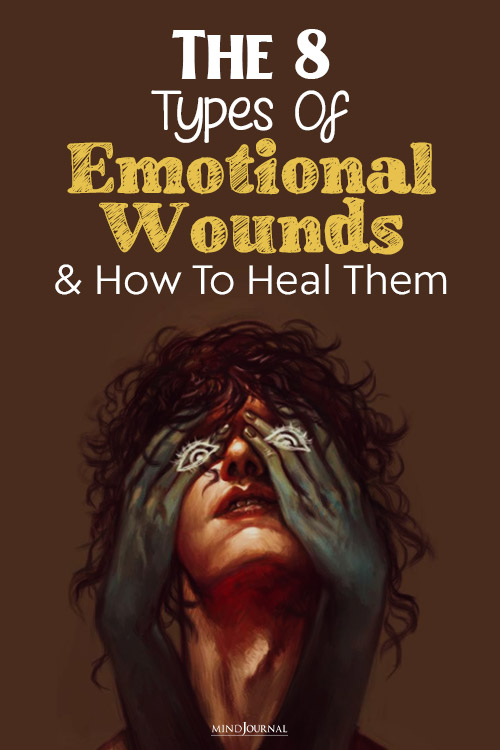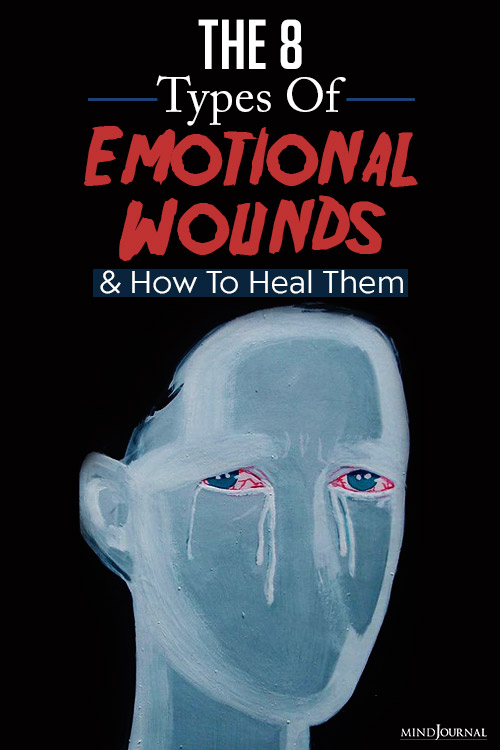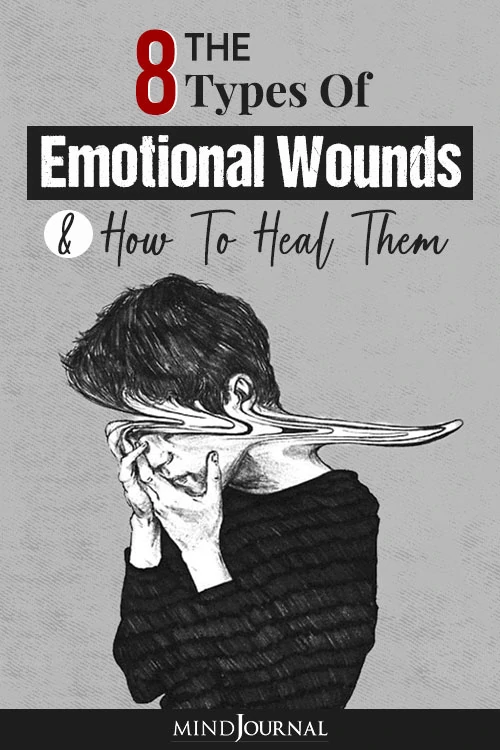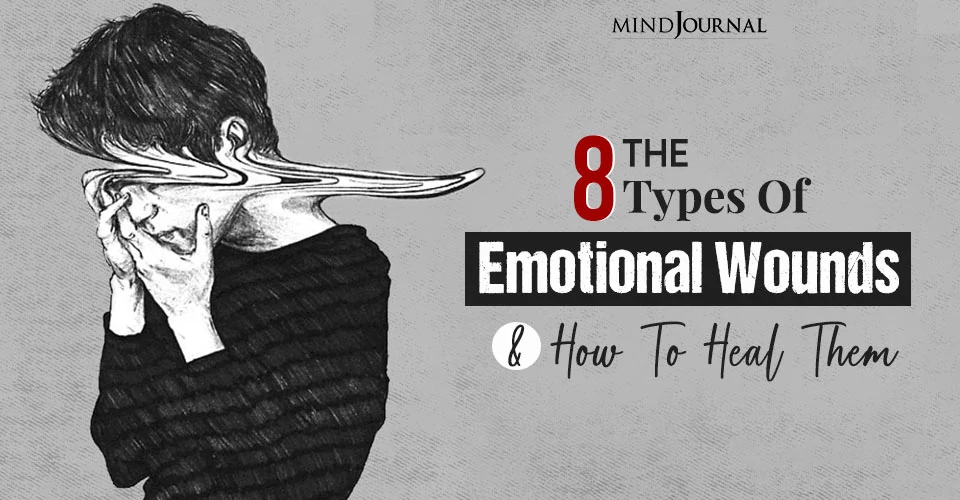We are all likely to endure traumatic experiences in our lifetime. However, based on the severity and frequency, some experiences can leave deep emotional wounds that end up influencing our whole perception of life, the way we see ourselves, and the choices we make.
In most cases, we go through these experiences quite early in our lives, making the quest of healing emotional wounds tangled with the challenge of healing our inner child. But before we learn how to heal emotional wounds, let’s have a look at the most common types.
8 Types Of Emotional Wounds
The phrase “emotional wounds” has psychological as well as spiritual connotations and we have compiled our list by conflating these two disciplinary courses.
1. Mother Wound
Although it is commonly seen as a mother-daughter phenomenon, both sons and daughters can be on the receiving end of a mother wound, inflicted by an emotionally unavailable and often hypercritical mother. A mother wound is a traumatic experience where a child is not provided with the much-needed emotional support and nurturing care. The child grows up desperately seeking validation from the mother and always feels nervous and scared in her presence. Such a child can never turn to the mother for comfort and care.
It is often a cross-generational curse. Women who could never heal their mother wound tend to carry the toxic behavioral pattern to the next generation. Unresolved issues from a mother wound can also make you question your self-worth, crave external validation, and become incapable to manage emotions.
Steps You Can Take Towards Healing Mother Wound Issues:
- Forgive your mother even if she doesn’t deserve it.
- Seek help from a peer group with similar experiences.
- Become your own parent and take care of your needs.
- Work on yourself and develop a profound self-awareness.
- Communicate and express your pain constructively.
- If required distance yourself from the dysfunctional relationship.
2. The Dark Night Of The Soul
Coined way back in the 16th century by a Roman Catholic priest, the term denotes the anguish of a soul when it is separated from God. Since then the idea has been adopted by various religious, spiritual, and psychological practices and used to describe an extremely painful period of existence during which a person loses all hope and motivation to live.
The suffering individual’s faith is shaken to the core and the universe ceases to make any sense to them. The tortured soul faces one hardship after another but eventually emerges as an empowered and aware being. The spiritual belief behind this concept is that our souls choose to go through painful lessons in order to attain enlightenment. By shedding the skins of old beliefs and knowledge the soul becomes more attuned to the ways of life and the universe.
Steps You Can Take Towards Healing The Dark Night Of The Soul Issues:
- Work on the repetitive behavioral patterns you are perpetuating in your life.
- Focus on the lessons that your pain is bringing to your attention.
- When the external world stops making any sense, go inward and learn your inner truth.
- Contemplate your journey so far and realize what you want from the future.
- Learn about your authentic self and stop trying to fit in with others for their validation.
Related: Structural Dissociation: How Complex Trauma Causes A Split In Our Being
3. Abandonment
This can be one of the most damaging causes of emotional wounds. When a parent deserts their kid or fails to provide them a secure life, far-reaching damage is done to the psyche of the vulnerable child. The absence of the parent and the lack of care make the child grow up with a host of emotional issues.
As adults, these children may become loners or develop a fear of loneliness. They are likely to get emotionally dependent and insecure in nature. People with abandonment issues are known to quit projects and dump their partners more often than others. Their constant fear of being left out in the cold drives them to act this way.
Steps You Can Take Towards Healing Abandonment Issues:
- Understand your fears and don’t project them on others.
- Set healthy boundaries in all your relationships.
- Prioritize self-care and take care of yourself more.
- Seek therapy to address your psychological trauma.
4. Rejection
Rejection can come in many forms such as rejection by peers, by partner, or by parents. Regardless of whom rejection comes from, it can have detrimental effects on our self-esteem and self-awareness. Especially when a child experiences rejection from their primary caregiver, instead of unconditional love and acceptance, it opens a gnawing hole in their little heart.
Even after growing up, such a child will think of themselves as unworthy and undeserving of love. A person with rejection issues will always downplay their achievements and live as a recluse, afraid of opening up to others.
Steps You Can Take Towards Healing Rejection Issues:
- Face your internalized fears and anxious thoughts.
- Take more chances to showcase your talents.
- Be assertive.
- Work on your insecurities and do things that make you happy.
- Don’t attach your self-worth to others’ appreciation.
5. Injustice
When we are exposed to an unjust environment as a child, our idea of right and wrong becomes tainted. Growing up under an authoritarian parent or witnessing favoritism at school can affect our sense of justice. As a result, some of us can become very rigid in our approach and set very high standards for ourselves as well as others.
People with this emotional baggage tend to become sticklers for rules and expect the same level of perfection and sincerity from others in all spheres of life. As a result, they come off as obnoxious and don’t have many friends.
Steps You Can Take Towards Healing Injustice Issues:
- Identify your trust issues.
- Reduce your rigidity and become more flexible.
- Lower your high standards of expectations.
- Open up more and take chances with people.
- Accept others without judgment.
6. Violence
Children growing up in a toxic family often witness violence between their parents or suffer violence as a form of disciplinary action. Needless to say, such an unhealthy experience distorts and destabilizes the child’s mind and they start internalizing the violent pattern.
As a result, even after growing up, the child with this poor behavioral reference will repeat this abusive cycle in their adult life. Either they will become aggressive or violent with their partners or attract abusive lovers for themselves.
Related: Codependency in Toxic Relationships: Symptoms, Signs and How To Recover
Steps You Can Take Towards Healing Violence Issues:
- Seek therapy or consult a mental health professional.
- Recognize the need for effective anger management.
- Improve your self-image and make healthy choices while choosing your romantic partners.
- Identify the reasons you are perpetuating the toxic cycle of abuse.
7. Humiliation
When people are systematically humiliated, they start developing low-self esteem and anxiety. Whether being bullied at school or mistreated for airing an opinion at home, humiliation for days on end can destroy our self-confidence and well-being and make us mentally dependent on others.
People who have been exposed to humiliation for a long time either lose their ambition or become tyrannical as a defense mechanism. They might choose to humiliate others for protecting their own emotions.
Steps You Can Take Towards Healing Humiliation Issues:
- Be more independent.
- Work on the priorities of your life.
- Express yourself more.
- Know from where your fears are triggering.
- Be kind to others and stop pushing people away.
8. Betrayal
When parents often go back on their words or don’t keep their promises, kids start developing a habit of mistrust or a fear of trusting others. Children who realize they cannot depend on their caregivers tend to become skeptical and doubtful about everyone.
Adults who have suffered betrayal sometimes feel that they need to have some kind of control or leverage over others. This belief makes them the suspicious and controlling kind.
Steps You Can Take Towards Healing Betrayal Issues:
- Learn how to trust others.
- Delegate responsibilities at work.
- Improve your patience level.
- Be more tolerant of others.
It Ends With You
Although you had little control over the situations that gave rise to your emotional wounds, you can always take your power back. What happened to you is neither your identity nor does it have to become your future. You are the writer of your story. Don’t let your emotional wounds fester and infect your next generation.
Related: The Reason Emotional Trauma Doesn’t Heal and How to Overcome It











Leave a Reply
You must be logged in to post a comment.